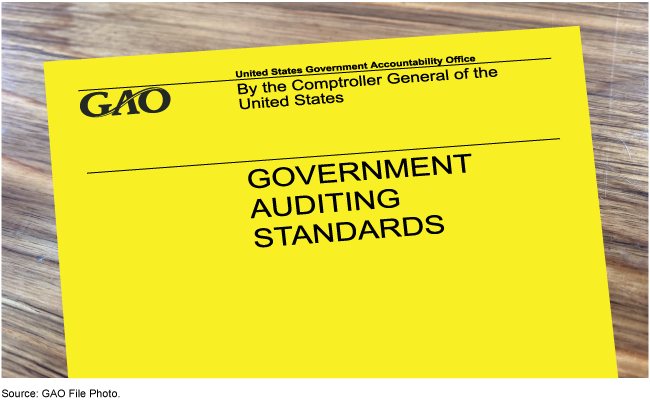Government Auditing Standards 2024 Revision
Fast Facts
Auditors around the world use our Yellow Book—Government Auditing Standards—to perform effective government audits. We maintain the Yellow Book and stay on top of domestic and international auditing standards.
This update enhances how audit organizations manage audit quality. Effective quality management can reasonably assure an audit organization that its people, audits, and reports adhere to professional standards and applicable laws.
Another updated area adds guidance for financial audits.

Highlights
What GAO Found
GAO has updated Government Auditing Standards (commonly known as the Yellow Book) to reflect new developments related to audit organizations' systems of quality management. These standards are intended to help ensure that an audit organization produces reliable, objective, and high-quality engagements for use in holding management and officials entrusted with public resources accountable for carrying out their duties.
The 2024 revision of Government Auditing Standards contains major changes from, and supersedes, Government Auditing Standards 2018 Revision Technical Update April 2021. Specifically, chapter 5, "Quality Management, Engagement Quality Reviews, and Peer Review" in the 2024 revision replaces chapter 5, "Quality Control and Peer Review," in the 2018 Revision. In addition, application guidance is added to chapter 6, "Standards for Financial Audits," in this 2024 revision.
Some of the changes in the 2024 revision of Government Auditing Standards reflect:
- an emphasis on the responsibility of an audit organization's leadership for proactively managing quality on its engagements.
- an approach that promotes scalability of the system of quality management for use by audit organizations differing in size and complexity
- a risk-based process for achieving the objectives of quality management.
- a change in approach from quality control to quality management
- flexibility for audit organizations subject to other quality management standards to avoid the burden of designing, implementing, and operating separate systems of quality management.
- promotion of proactive and effective monitoring activities and increased emphasis on tailoring monitoring activities
- provisions for optional engagement quality reviews of GAGAS engagements
- application guidance on key audit matters for when they may apply to financial audits of government entities and entities that receive government financial assistance.
Effective Date
Government Auditing Standards 2024 Revision is effective for financial audits, attestation engagements, and reviews of financial statements for periods beginning on or after December 15, 2025, and for performance audits beginning on or after December 15, 2025. A system of quality management that complies with Government Auditing Standards is required to be designed and implemented by December 15, 2025. An audit organization should complete its evaluation of the system of quality management by December 15, 2026. Early implementation is permitted.
Revision Process
Revisions of Government Auditing Standards undergo an extensive, deliberative process, including public comments and input from the Comptroller General's Advisory Council on Government Auditing Standards. GAO considered all comments and input in finalizing revisions to the standards.
Why GAO Did This Study
This update is intended to strengthen and modernize an audit organization's system for managing engagement quality using a proactive and risked-based approach.
For more information, contact James R. Dalkin at (202) 512-9535 or yellowbook@gao.gov. Visit GAO’s Yellow Book website for more information on applicable updates and alerts.
The 2024 Yellow Book is also available in a digital format.
